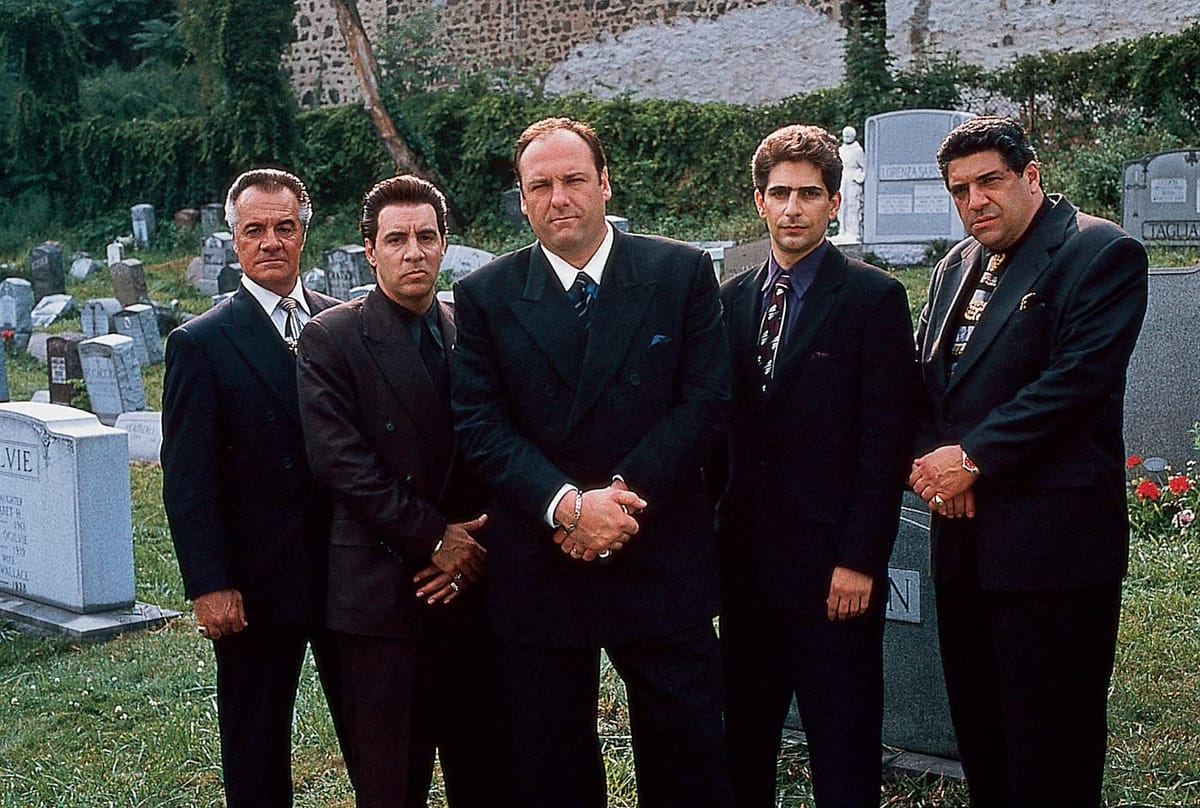Indoor Cycling, Tony Soprano, and the American Empire
Revisiting The Sopranos during a winter of indoor cycling, I ponder its relevance in 2025. Is Tony Soprano a mob boss, a metaphor for America, or just overrated? Read on for hot takes and cold truths.

As temperatures drop and outdoor cycling becomes a frostbite risk, I’ve retreated to my pain cave (a fancy term for "garage with a bike trainer"). But a cyclist needs a distraction from the endless whir of the trainer wheel, and this year I chose The Sopranos. Or, more accurately, I chose to pick a fight with the widely accepted notion that it's the greatest TV show of all time.
Let’s be clear: The Sopranos is good. But is it great? As I grind through Zwift’s virtual Alps, watching Tony grind his way through suburban New Jersey, I’m starting to think the answer is no.
Goodfellas, But Make It Therapy
When The Sopranos debuted in 1999, it revolutionized TV, making antiheroes like Tony Soprano the toast of Sunday nights. A mob boss in therapy? Brilliant concept. Gandolfini’s portrayal of Tony is iconic, no argument there. But peel back the cannoli-laden layers, and what’s left? A story about a sociopathic capitalist who refuses to change—both a fascinating metaphor for America and, honestly, kind of boring.
Tony Soprano doesn’t evolve. He rationalizes. His therapy with Dr. Melfi is a narrative fulcrum, a collision of sacred self-reflection and profane mobster reality. But ultimately, it’s just spin. Tony’s panic attacks and dream sequences tease change but deliver none. Instead, they mirror the spiritual decay of a society more interested in rationalizing greed and violence than confronting its demons. Sound familiar?
The genius of the therapy framing device lies in its duality: It’s both a mirror for Tony’s psyche and a funhouse reflection of America’s. Dr. Melfi’s professional ethics clash with her growing fascination with Tony’s tales of violence and betrayal. Much like the educated elite she represents, Melfi profits from proximity to power without directly participating in its abuses. Her eventual decision to terminate Tony’s therapy is less a moral stand and more an acknowledgment that she’s been complicit all along.
Tony doesn’t want to change; he wants to repackage his old sins as new insights. If that sounds familiar, it’s because it’s the same song America has been singing for decades: reframing greed as ambition, violence as necessary, and decline as destiny.
America, The Mob, and the Bust-Out Metaphor
In 2025, with Trump poised to retake the White House, The Sopranos feels less like a drama about one man’s moral decline and more like a prophetic allegory of American empire. Tony’s "bust-outs," where he bankrupts businesses for quick profit, mirror the zero-sum greed driving America’s political and corporate elites. Substitute hedge funds for mobsters, and Tony might as well be running Wall Street.
This metaphor is most striking in the show’s later seasons, as Tony’s schemes grow increasingly desperate. In one memorable storyline, his crew inflates home values through a crooked appraiser to scam buyers. It’s a small-scale version of the speculative frenzy that would soon bring the global financial system to its knees. Like the mafia, capitalism thrives on exploitation, and Tony’s moral void serves as a warning against unbridled greed masquerading as business as usual.
And yet, some fans still view Tony as aspirational. This misreading isn’t unique to The Sopranos. Walter White in Breaking Bad, Jordan Belfort in The Wolf of Wall Street, and even Judge Dredd—all characters meant to critique power and selfishness—have been embraced by a subset of viewers as heroes. It’s what I call The Soprano Syndrome: rooting for the villain because their ruthlessness validates our own worst impulses.
"But Pine Barrens!" Yeah, Okay.
Diehard fans will point to iconic episodes like "Pine Barrens." Yes, it’s great. Yes, the Russian is still out there somewhere. But one fantastic episode doesn’t absolve the show’s bloat, its clunky symbolism, or its tendency to introduce characters only to discard them like Adriana in a forest.
The show’s sprawling cast is both its strength and its weakness. Characters like Christopher Moltisanti and Bobby Bacala offer moments of genuine pathos, but others feel underdeveloped or redundant. Paulie and Silvio, for all their charm, are essentially interchangeable—cartoonish caricatures of mobsters who rarely deviate from their shtick. And don’t get me started on A.J., who might be the least compelling character in prestige TV history. His overwrought existential crises feel less like a window into generational malaise and more like an audition tape for bad teen drama.
Then there’s the finale, which dared to cut to black without answering the big question: Did Tony live or die? Spoiler alert: It doesn’t matter. Tony’s arc had already flatlined. The ambiguity was bold, sure, but it also felt like a shrug—a fitting end for a show that often mistook inertia for depth.
The Shadows of the American Psyche
What The Sopranos captures best is the bathetic nature of decline. Tony’s story isn’t one of a dramatic fall from grace but a slow-motion slide into mediocrity and moral rot. His empire, much like America’s, is a house of cards propped up by denial and hubris. The parallels are uncomfortable, which is precisely why the show remains relevant.
By framing its critique through Tony’s therapy, The Sopranos turns the personal into the political. His panic attacks echo the anxieties of a superpower confronting its limits. His rationalizations mirror a culture addicted to violence and greed. And his ultimate failure to change serves as a stark reminder that self-awareness without action is just another form of complacency.
Is It Great?
Rewatching The Sopranos during indoor cycling season has been a mixed bag. It’s undeniably good TV, with moments of brilliance that still resonate. But greatness? Greatness requires more than influence and iconic episodes. It demands depth, tension, and the courage to challenge its audience. Too often, The Sopranos settles for circling the same thematic drain without ever diving deeper.
So as I pedal away in my garage, I’ll keep watching—not because I think The Sopranos is the best show ever made, but because it’s a compelling, flawed mirror of a compelling, flawed society. And sometimes, that’s enough.





